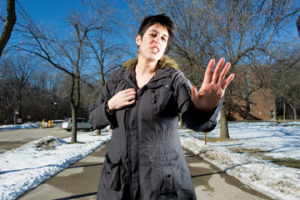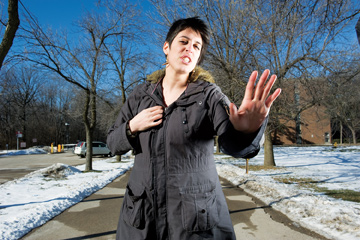Nicholas Maronese
Editor-in-Chief
I’m really awkward off the mic,” Lishai Peel admits.
When she’s not on stage, she sounds like everybody else – there’s a certain uncertainty in her voice and her speech is spattered with tame, tired clichés.
But when she’s on stage at a poetry slam, Lishai is – pardon the cliché – in her element.

She speaks in pure, purple metaphor, her body rolls with the rhythm of her words, and her soft Yorkshire accent peaks with a sharp lilt and a slight slurring that blends it all together perfectly.
On the mic she fights her nervousness and waxes political about social justice, laying down verse after verse about rape, war and racial inequality.
And off the mic she puts those words into action, awkwardness be damned.
Lishai is part of the small, but growing, Toronto slam poetry scene, a group bent on taking spoken word poetry and making it competitive by adding time limits, regulations, rules, judges and scoring.
“Slam poetry is like a blood sport,” Lishai explains. “People get so into it.”
There’s no animosity between poets, she clarifies, but there’s definitely an intensity that, at times, can be intimidating.
That’s why Lishai, an international development student in her last year at York University, is working with some of the bigger Toronto slam poetry groups – the Toronto Poetry Project and African-Canadian-centred Up From the Roots, for example – on forming a women-focused slam poetry organization, the Kemba Collective.
“I think for a lot of women there’s a fear of judgment, and that it might be harder for them to represent themselves in a venue where it’s all men,” she says.
The Ontario scene is generally male-dominated – Toronto Poetry Project coordinator David Silverberg agrees most slams play host to more male than female poets and audience members – and there needs to be more representation for queer folk, women of colour and trans people, says Lishai.
She would know. Though she was only introduced to slam poetry one year ago, Lishai has risen quickly through all parts of the scene: she’s competed all over Canada and the U.S., including at the Toronto International Poetry Slam; nationals at the Canadian Festival of Spoken Word, Canada’s premiere slam poetry contest; and soon in Vancouver for the first Canadian Individual Slam Championship.
For the last two years, the Festival of Spoken Word winners have been an Ottawa-based team made up entirely of men.
It’s not that women can’t step up to the competition, she explains, it’s that the men often can’t step down.
“I think the male ego won’t really allow [men to be less competitive]. The men are just so hardcore about it,” Lishai says. “But I think the women can be just as competitive as men – they have some very heavy words to share.”
Lishai says the inspiration for the Kemba Collective was seeded long ago, but recent efforts to bring the project together were triggered by the loss of some of Toronto’s female spoken word leaders, like national champion Truth Is, who recently moved to Ottawa. Leaders are what’s needed, she says, to inspire other women, and a women-only conference – like the U.S.-based Women of the World competition, at which Lishai will be representing Toronto this year – would help, too.
Using catalyst funds from the Laidlaw Foundation, Lishai and the other women behind the Collective aim to launch the project within the next two months, and are now booking venues and working on a website.
But more than just a safe space for women, Lishai sees the Collective as a highly collaborative community-focused group that will help rejuvenate and unify the somewhat disjointed Toronto scene. The Kemba Collective will use multiple partnerships to host open mic nights, set up workshops and generally build a more enabling environment in the Greater Toronto Area.
While the aim is to encourage women to step to the mic, there’s room for men in the Collective, too.
“It’s not about revolutionizing the world of spoken word poetry for women,” she says. “It’s not a response to the male domination of the scene, because I don’t see that as a negative thing. Poetry is a beautiful thing, whether it’s women or men stepping onto the stage.”
“It’s just about creating a space for women’s voices to be celebrated,” says Lishai.
She also hopes the Kemba Collective will support poets financially, using a cooperative economics model to dole out whatever funds they can. While some poets have netted local grants to help support their work, most slams offer only a small prize sum for the winners.
At a Valentine’s Day-themed tournament this past February, for example, the centerpiece of Lishai’s first place trophy was a small, glass unicorn lit by a rainbow-striped bulb. She didn’t mind, of course, and at the end of the evening was proud to hold the shimmering stallion high above her head – awkwardness be damned.
For more information, check out www.lishai.ca
Space for sisters on the mic


